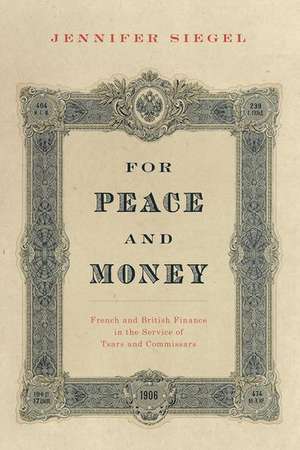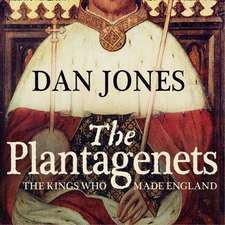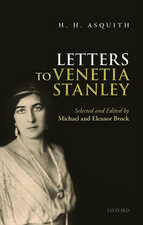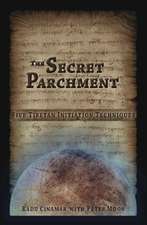For Peace and Money: French and British Finance in the Service of Tsars and Commissars: Oxford Studies in International History
Autor Jennifer Siegelen Limba Engleză Paperback – 14 sep 2017
| Toate formatele și edițiile | Preț | Express |
|---|---|---|
| Paperback (1) | 304.11 lei 31-37 zile | |
| Oxford University Press – 14 sep 2017 | 304.11 lei 31-37 zile | |
| Hardback (1) | 468.75 lei 31-37 zile | |
| Oxford University Press – 15 ian 2015 | 468.75 lei 31-37 zile |
Preț: 304.11 lei
Preț vechi: 345.10 lei
-12% Nou
Puncte Express: 456
Preț estimativ în valută:
58.20€ • 60.54$ • 48.05£
58.20€ • 60.54$ • 48.05£
Carte tipărită la comandă
Livrare economică 03-09 aprilie
Preluare comenzi: 021 569.72.76
Specificații
ISBN-13: 9780190695767
ISBN-10: 0190695765
Pagini: 326
Dimensiuni: 155 x 234 x 23 mm
Greutate: 0.48 kg
Editura: Oxford University Press
Colecția OUP USA
Seria Oxford Studies in International History
Locul publicării:New York, United States
ISBN-10: 0190695765
Pagini: 326
Dimensiuni: 155 x 234 x 23 mm
Greutate: 0.48 kg
Editura: Oxford University Press
Colecția OUP USA
Seria Oxford Studies in International History
Locul publicării:New York, United States
Recenzii
The empirical richness of For Peace and Money is stunning. Based on dozens of personal, corporate, and state archives located in several countries, its intelligent treatment of the relationship between finance and diplomacy is unlikely to be surpassed anytime soon For Peace and Money is a fine piece of research. Exhaustively researched, fluidly written, and intelligently argued, it opens new dialogues between economic, diplomatic, and global history. Scholars and students in all three fields will find it an invaluable resource.
Jennifer Siegel's new book nicely demonstrates how fundamental financial policy was for the conduct of great power diplomacy before and during World War 1...Siegel's book provides a very readable narrative, and she is at her best scouring the archives for telling quotations from bankers, diplomats, and political leaders, particularly at moments of acute crisis."-Peter Gatrell, Slavic Review
Debt, as Siegel demonstrates, bolstered a tottering system and enabled Russia to operate far beyond its means. Harding's phrase about the need for peace and money, from which the book takes its title, aptly distills the situation. Until war upset a delicate equilibrium, borrowing meant strength not weakness... Besides adding to historical scholarship on diplomacy surrounding World War I, Siegel's lucid, well-informed analysis engages questions relevant to today's concerns.
Jennifer Siegel has written a gripping and entirely convincing narrative of the financial struggle that preceded the outbreak of war in 1914, and a fine account of the way in which a weak power used debt to manipulate the diplomacy of the stronger powers.
This is a fascinating and original work on the role of British and French finance in their relations with late-imperial but also early-Soviet Russia. Both diplomatic and financial history are unfashionable among contemporary Western historians: all the more refreshing therefore to read a truly path-breaking work dedicated to this topic. Professor Siegel brings to this study not just much research in a range of Russian and Western archives but also insights derived from her own first-hand experience of the financial world. Anyone interested in not just Russian history but also international relations in the era of the First World War should read this book.
Jennifer Siegel's superbly researched and powerfully argued monograph provides an exciting new perspective on the era of the First World War. For Peace and Money illuminates the crucial role played by financial diplomacy in the evolution of the Triple Entente before 1914, in the political dynamics of the Allied cause during the Great War, and in the international effort to rebuild European politics and society after that conflict. Siegel's highly original analysis challenges us to rethink the politics of indebtedness among Great Powers. The result is an ambitious reinterpretation of international relations during this period of profound upheaval and systemic change.
In this important study, Siegel documents the role played by French and British lenders in underwriting Russia's transformation into a modern industrial and military power before World War I and the allies' financial support of the empire's participation in that conflict. Written in accessible prose and supported by impressive evidence from all three countries, this study reminds readers of the central role of finance in international relations, while showing them that its role is often more ambiguous than they might expect.
“As an exercise in diplomatic history, this book deserves great praise, not least for the attempt to broaden the analysis to include international finance.”-Ranald Michie, Journal of British Studies
“Siegel's talent for storytelling broadens the book's appeal, as does her simple explanations of financial instruments and biographies of key actors…. For Peace and Money's telling of Russia's sovereign debt negotiations reveals Russia's role in shaping European diplomatic and financial relationships before, during, and immediately after WWI. The book will interest diplomatic historians, financial historians, and those interested in the Great War.”-Amanda Gregg, Journal of Economic History
“Expertly-framed and very well-researched…. Siegel's book is a delight to read and deserves to reach a wide audience, as it is provocative in a very good way.”-Vincent Barnett, Slavonic and East European Review
“Siegel makes significant new contributions to our understanding of the interrelationship between finance and diplomacy in the processes leading to the outbreak of the Great War and to the Russian Revolution, in the conduct of the war by the Western allies, in their negotiations over the termination of the war, and in the economic and social recovery from the war in Europe…. For Peace and Money will be of great interest to international-relations scholars as well as to financial and diplomatic historians. The subfield of the political economy of peace, war, and security is currently one of the most vibrant areas of research in the field of International Relations.”-Jack S. Levy, H-Diplo Roundtable
“Since the turn towards the 'global' and 'transnational,' historians have been aware of the layers of interdependency across European societies… Siegel's account offers a model of how to integrate the moment of decision-making with this interdependent environment.”-William Mulligan, H-Diplo Roundtable
“[Siegel's] account of the role of bankers in the relationship among the French, British and Russians during the period leading up to World War I provides a striking example of the impact of credit, and efforts on the part of governments to influence the financial market….A valuable contribution for those interested in the financial aspects of World War I.”-Eakernomics
Jennifer Siegel's new book nicely demonstrates how fundamental financial policy was for the conduct of great power diplomacy before and during World War 1...Siegel's book provides a very readable narrative, and she is at her best scouring the archives for telling quotations from bankers, diplomats, and political leaders, particularly at moments of acute crisis."-Peter Gatrell, Slavic Review
Debt, as Siegel demonstrates, bolstered a tottering system and enabled Russia to operate far beyond its means. Harding's phrase about the need for peace and money, from which the book takes its title, aptly distills the situation. Until war upset a delicate equilibrium, borrowing meant strength not weakness... Besides adding to historical scholarship on diplomacy surrounding World War I, Siegel's lucid, well-informed analysis engages questions relevant to today's concerns.
Jennifer Siegel has written a gripping and entirely convincing narrative of the financial struggle that preceded the outbreak of war in 1914, and a fine account of the way in which a weak power used debt to manipulate the diplomacy of the stronger powers.
This is a fascinating and original work on the role of British and French finance in their relations with late-imperial but also early-Soviet Russia. Both diplomatic and financial history are unfashionable among contemporary Western historians: all the more refreshing therefore to read a truly path-breaking work dedicated to this topic. Professor Siegel brings to this study not just much research in a range of Russian and Western archives but also insights derived from her own first-hand experience of the financial world. Anyone interested in not just Russian history but also international relations in the era of the First World War should read this book.
Jennifer Siegel's superbly researched and powerfully argued monograph provides an exciting new perspective on the era of the First World War. For Peace and Money illuminates the crucial role played by financial diplomacy in the evolution of the Triple Entente before 1914, in the political dynamics of the Allied cause during the Great War, and in the international effort to rebuild European politics and society after that conflict. Siegel's highly original analysis challenges us to rethink the politics of indebtedness among Great Powers. The result is an ambitious reinterpretation of international relations during this period of profound upheaval and systemic change.
In this important study, Siegel documents the role played by French and British lenders in underwriting Russia's transformation into a modern industrial and military power before World War I and the allies' financial support of the empire's participation in that conflict. Written in accessible prose and supported by impressive evidence from all three countries, this study reminds readers of the central role of finance in international relations, while showing them that its role is often more ambiguous than they might expect.
“As an exercise in diplomatic history, this book deserves great praise, not least for the attempt to broaden the analysis to include international finance.”-Ranald Michie, Journal of British Studies
“Siegel's talent for storytelling broadens the book's appeal, as does her simple explanations of financial instruments and biographies of key actors…. For Peace and Money's telling of Russia's sovereign debt negotiations reveals Russia's role in shaping European diplomatic and financial relationships before, during, and immediately after WWI. The book will interest diplomatic historians, financial historians, and those interested in the Great War.”-Amanda Gregg, Journal of Economic History
“Expertly-framed and very well-researched…. Siegel's book is a delight to read and deserves to reach a wide audience, as it is provocative in a very good way.”-Vincent Barnett, Slavonic and East European Review
“Siegel makes significant new contributions to our understanding of the interrelationship between finance and diplomacy in the processes leading to the outbreak of the Great War and to the Russian Revolution, in the conduct of the war by the Western allies, in their negotiations over the termination of the war, and in the economic and social recovery from the war in Europe…. For Peace and Money will be of great interest to international-relations scholars as well as to financial and diplomatic historians. The subfield of the political economy of peace, war, and security is currently one of the most vibrant areas of research in the field of International Relations.”-Jack S. Levy, H-Diplo Roundtable
“Since the turn towards the 'global' and 'transnational,' historians have been aware of the layers of interdependency across European societies… Siegel's account offers a model of how to integrate the moment of decision-making with this interdependent environment.”-William Mulligan, H-Diplo Roundtable
“[Siegel's] account of the role of bankers in the relationship among the French, British and Russians during the period leading up to World War I provides a striking example of the impact of credit, and efforts on the part of governments to influence the financial market….A valuable contribution for those interested in the financial aspects of World War I.”-Eakernomics
Notă biografică
Jennifer Siegel is professor of history at The Ohio State University. She is the author of Endgame: Britain, Russia and the Final Struggle for Central Asia, which won the Barbara Jelavich Prize of the American Association for the Advancement of Slavic Studies, and the co-editor of Intelligence and Statecraft : The Use and Limits of Intelligence in International Society.



























